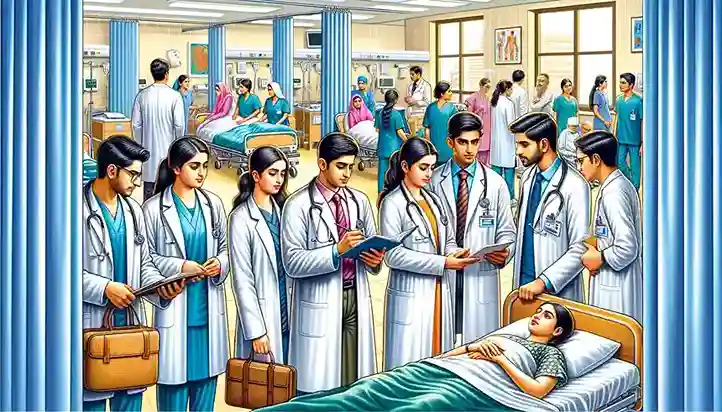Hello future doctors. The National Medical Commission Act 2019, has come up with an interesting proposal.
Usually, in Final Year MBBS, you will give your Professional exams, which is the University Exam. If you pass this exam, you will get your degree and medical license after the Internship period. (But you can call yourself a Doctor as soon as you get the University results) Similarly, people studying MBBS abroad can appear for the FMGE exam and get licensed in India if they clear it.
After this comes the NEET PG exam, which is given after the internship period. This exam allows you to get admission into PG courses. There is a counseling process similar to the NEET UG counseling process where you can fill in your choices and hope for the best.
How is NExT different?
Now, the National Exit Test, also called the NExT exam, aims to unify all these different exams into one single exam. It will allow you to ‘Exit’ the MBBS course with your degree only if you qualify it. Also, instead of having to attempt another exam for NEET PG, your NExT exam scores will be used for the PG counseling.
Think of this as the 10th board exams. You have to pass it in order to clear 10th grade and also these scores are needed to get admission into 11th grade classes.

This was just a very brief overview on what the NExT exam is. In this article, I am going to break down the reason for proposing this exam, its pattern, and the implications for everybody. So, read till the end.
What are the functions of the exam?
NExT is the exam that every medical student will have to pass in order to get licensed to practice in India. It will serve 3 main functions.
- Licensing Exam for Students: Granting the license to practice medicine. So, it is essential to pass the final year of MBBS.
- Entrance Exam for PG: Serving as an entrance test for postgraduate (PG) medical courses. So, it will replace the NEET PG exam.
- Screening Test for Foreign Medical Graduates: It will replace the Foreign Medical Graduates Examination (FMGE) for foreign medical graduates who wish to practice in India.
Why was the NExT exam proposed?
The NMC saw some problems faced by the medical students and the public. In an attempt to fix these, the NExT exam was proposed.
1. One exam for all: As I’ve already said before, NExT will unify the Final Year MBBS exam, NEET PG exam and FMGE exam. The process will thus be simplified for everybody. students will also have to worry about just clearing one exam.
2. Creating a Uniform Standard: Right now, different states have different University level exams. This means that there are a lot of differences in the standard of education. Some states have an easier standard to pass while others have a relatively difficult one. NExT aims to create a uniform standard across the country.
You can think of this analogous to the NEET UG exam being put into place to replace the state medical entrance exams. It brought a lot of uniformity to the process.

3. Improving Medical Competency: By setting a national standard, NExT will ensure that every practicing doctor has a uniform competency level. This will ensure that medical colleges all over India are persuaded to improve their education process.
4. Transparency: NExT aims to bring transparency to the medical education system. A uniform exam as already said, will minimize regional biases and variations in examination difficulty. It aims to bring fairness.
Eligibility of the NExT Exam
To be eligible for the NExT exam, candidates must:
- Have completed their MBBS degree from a medical college recognized by the National Medical Commission (NMC).
- For foreign medical graduates, they must have completed their primary medical qualification from a recognized institution abroad. They must also have undergone the requisite duration of internship as prescribed by NMC.
Exam Pattern
The NExT exam will be conducted in 2 parts: NExT 1 and NExT 2.
NExT 1
- When? After the final year of the MBBS course.
- How? The exam will be a computer-based test (CBT) consisting of multiple-choice questions (MCQs). (Similar to JEE Mains Exam). It will be conducted over 3 days with 2 sessions each day.
- Total Number of Questions? 540, of which 65% will be based on problem solving and analytical skill, 25 % comprehension type and rest 10% will be recall based.
- Subjects Covered? It will include all the subjects taught during the MBBS course, it will focus more on the clinical and applied aspects.
- Passing percentage? A 50% score will be required to clear the exam.
- Negative Marking? Not applicable
- Number of Allowed Attempts: Candidates should clear NExT 1 exam within 10 years of joining MBBS. You can give as many attempts as you want to within this period.
Practicals in NExT 1: There will be regular Univerisity practicals for final year MBBS after the results of NExT 1 CBT test and before the start of the internship.
| Days | Subjects | Number of Questions | Duration |
| Day 1 | Medicine & allied subjects | 120 | 180 minutes |
| Paediatrics | 60 | 90 minutes | |
| Day 2 | Surgery & Allied | 120 | 180 minutes |
| ENT | 60 | 90 minutes | |
| Day 3 | Obstetrics & Gynaecology | 120 | 180 minutes |
| Opthalomology | 60 | 90 minutes | |
| Total | 540 | 810 minutes |
NExT 2
- When? After the completion of a compulsory internship.
- How? This will be a practical/clinical exam. Similar to the practical exams taken during Profs.
- Why? NExT 2 assesses the practical and clinical skills of the candidates.
- Format: This part of the exam will involve real-life patient scenarios and hands-on tasks.
- Assessment Areas: Clinical skills, patient interaction, diagnostic abilities, communication and overall professional behavior.
- NExT 2 will ensure that candidates are not only knowledgeable but also capable of applying their knowledge in real-world settings.
Implications of the NExT Exam
For Medical Students
- Reduced Examination Load: Instead of multiple exams, students will only need to focus on passing the NExT exam, but
- Difficult to Clear: The NExT exam makes the transition from subjective written papers to an objective MCQ based exam. Statistically, these are more difficult to clear.
- High Rankers: Will secure PG seats and proceed with internships, taking NExT 2 after completing their internship.
- Qualified but Low Rankers: Will either retake NExT 1 to improve ranks or proceed with internships and retake the exam later.
- Not Qualified: These students will have to repeat the exam in the next year. Only after passing the exam will they qualify for internships.
For Medical Colleges

- Setting a benchmark for the standard of education : Colleges will need to modify their teaching methods. They will have to up their games in order to meet the requirements of the NExT exam. This will ensure consistency in medical education across India.
- Quality Improvement: The pressure to perform well in NexT will push colleges to improve their overall quality of education. And good education equals good doctors.
For the Healthcare System
- Better and more competent doctors: The quality of doctors in India is expected to increase after this exam is implemented. Even today, the demand for doctors has been met on paper. There are enough doctors in India. Still, we all know the condition of Indian healthcare. A dramatic change is expected in this current situation, after the NExT exam comes into place.
That’s all about NExT. Although it was supposed to come into place a lot sooner, there is a lot of resistance from the medical fraternity.






